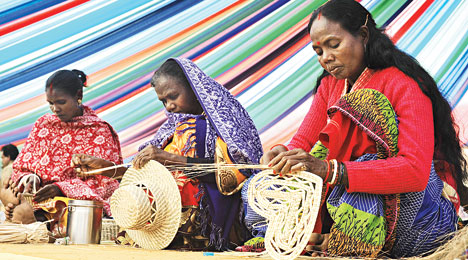
One of the most important things we can do around our food culture is reconnect to its sources, says celebrated food writer Michael Pollan in the Netflix series Cooked. “It means looking at traditions for what they still have to offer. Outsourcing has its values and it certainly makes life easier but it renders us all into passive consumers,” Pollan continues, grimly.
As if on cue, a farmer proudly proclaims, “So we outsource it to nature!” A simple and effective solution to the worldwide concern over industrialisation of food, not on Netflix, but at The Market Place in association with t2.
Held at Vedic Village Spa Resort on January 13 and 14, The Market Place saw a gathering of more than 100 farmers, along with farmers’ collectives and cooperatives, NGOs and academics, politicians and government officials and, of course, consumers. Also present were delegates from International Federation of Organic Agriculture Movements (IFOAM), a worldwide umbrella organisation for the organic agriculture movement.
“The Market Place is a weekend celebrating everything natural and organic. It urges us to adapt to the seasonal, ethical and sustainable world around us. This year’s market brought forward the farmer community in strength to interact with consumers and an urban audience, making it a success,” said Salmoli Mukerji, curator, The Market Place.
So, when Pramila Maity from Kanthi has a query regarding how to reach out to her customers to sell goyna bori, or Manira Khatun from Hingalganj wants to showcase the 35 varieties of rice from her farm, it’s The Market Place where they get an instant advice or a direct connect to the right consumer.
To sum it up, as Chaitresh Kumar Ganguly from The Timbaktu Collective, a farmers’ collective, put it: “The children of farmers are not doing farming any more because there is nothing in it. And if we, as consumers, are unable to give them back the real value for what they are doing then that would be fatal, not only for the farming community but also for us.”
The Market Place rang the alarm bell really loud and showed the way forward to a sustainable, organic and delectable future.


More than 70 varieties of rice, 15 types of bori (Bengal’s indigeneous lentil dumplings), nolen gur, corn cobs in five colours that grow naturally in the Indian soil, honey gathered from the Sunderbans, free-range chicken and duck eggs, different varieties of organic vegetables including sheem, brinjals, radish and their seeds... the Bish Mukto Haat (poison-free market) had 100-odd farmers from different parts of Bengal and other states like Odisha, Jharkhand, Chhattisgarh, Andhra Pradesh, Tamil Nadu and Karnataka displaying their organic produce.

.jpg)
That’s the way you roll... while some visitors tried their hand at the potter’s wheel, others picked up terracotta crafts on display. Handicrafts like handwoven cane hats, mats and bags were up for sale.







MUNCH MENU AT THE MARKET PLACE



According to the natural way of eating, even if you’re cooking a dish from another continent, your ingredients should be locally sourced. No wonder, the dinner menu by Italian chef Davide Cananzi lined up a variety of Italian dishes using ingredients from the Bish Mukto Haat — beetroot carpaccio, sweet potato mash, ravioli “inked” with spinach, roasted quails and wine-poached prawns.

If ‘eat local’ is the mantra, then Diva sous chef Anumitra Ghosh Dastidar’s menu was spot on, with Bengali favourites like Kumro Phool bhaja, Boal Maachher Rosha and Shoru Chakli Pithe. We loved the twist in the culinary tale as Anumitra fried the pumpkin flowers in tempura batter and served the shoru chakli pancakes with Loita Maachher bharta and Kalo Jeere Bata.

T2 PICKS







Text: Sibendu Das
Pictures: Arnab Mondal











